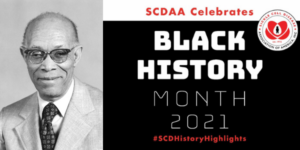New campaign to raise awareness about connection between sickle cell trait and deadly form of kidney cancer.
The Kidney Cancer Association (KCA) and the Sickle Cell Disease Association of America, Inc. (SCDAA) are partnering to launch the “KNOW & TELL” initiative today to raise awareness about sickle cell trait (SCT) and its link to a rare, aggressive type of kidney cancer called renal medullary carcinoma (RMC).
The year-long initiative seeks to promote the early identification of RMC by encouraging people to know their SCT status and inform their family and health care providers about the connection between SCT and RMC. Being aware of both SCT status and the rare RMC symptoms could help in identifying RMC early, obtaining appropriate care and increasing positive outcomes.
RMC typically affects young Black men under age 30 and about half of those diagnosed do not survive beyond 13 months.1 RMC makes up less than 1% of all kidney cancers but is almost exclusively found in people who carry SCT, a usually benign condition that can occasionally cause symptoms similar to sickle cell anemia.
“One of my key platforms is bringing greater awareness to rare types of kidney cancer and supporting research into treatments for underrepresented populations,” said the KCA’s Medical Director Sallie McAdoo, MS, CGC. “We’re proud to partner with SCDAA to bring greater awareness to RMC and its association with SCT through KNOW & TELL in the hope of helping those who are at risk identify it sooner, increase research into the condition, and improve outcomes.”
The SCDAA is an advocacy organization focused on education and advancing research for sickle cell conditions.
“We are excited to be partnering on this vital strategic initiative to increase awareness about SCT and one of the many possible complications tied to the trait,” said Beverley Francis-Gibson, president and CEO of the Sickle Cell Disease Association of America. “This campaign shows that knowledge is power and can have a big impact on care.”
Newborns are routinely screened for SCT however, those who carry the trait may not show symptoms and are therefore often not told they have it. Low awareness about SCT status and the lack of understanding about the link between SCT and RMC contribute to late-stage RMC diagnoses and shortened life expectancy.
“The RMC community may be smaller but is no less important than that of other cancer types and they are passionate about advocating for greater awareness about the disease and access to clinical trials for the opportunity to better understand and treat this rare cancer,” said Gretchen E. Vaughan, KCA’s president and CEO. “Partnering with the SCDAA for this initiative is the first step toward bridging the knowledge gap about the link between RMC and SCT.”
KNOW & TELL launches on June 18, following World Kidney Cancer Day on June 17, and in advance of World Sickle Cell Day on June 19. Learn more at www.kidneycancer.org/know-and-tell.
1. National Association for Rare Disorders
###
About the Kidney Cancer Association
The Kidney Cancer Association is a global community dedicated to serving and empowering patients and caregivers, and leading change through advocacy, research, and education in order to be the universal leader in finding the cure for kidney cancer. Founded in 1990 by Eugene P. Schonfeld and a small group of patients and doctors in Chicago, Illinois, the KCA has grown into an international non-profit organization based in Houston, Texas. The KCA promotes scientific advances through two annual research symposiums and a robust grant program, participates in legislative advocacy, and seeks to be a source of education and resources for patients, caregivers, and anyone impacted by kidney cancer.
Contact: Radha Chitale, Director of Communications. 847.332.1051 ext. 113 | rchitale@kidneycancer.org
About the Sickle Cell Disease Association of America
Sickle Cell Disease Association of America advocates for people affected by sickle cell conditions and empowers community-based organizations to maximize quality of life and raise public consciousness while advancing the search for a universal cure. The association and more than 50 member organizations support sickle cell research, public and professional health education and patient and community services. www.sicklecelldisease.org






 For our final #SCDHistoryHighlight of Black History month, we are excited to reflect on the life and work of Dr. Roland Scott. Dr. Scott has been celebrated as the “father of sickle cell disease” in the United States, and completed groundbreaking research as he advocated for his patients during a time of intense discrimination.
For our final #SCDHistoryHighlight of Black History month, we are excited to reflect on the life and work of Dr. Roland Scott. Dr. Scott has been celebrated as the “father of sickle cell disease” in the United States, and completed groundbreaking research as he advocated for his patients during a time of intense discrimination. We’re excited to continue our celebration of Black history this week by highlighting the life and work of Dr.
We’re excited to continue our celebration of Black history this week by highlighting the life and work of Dr.